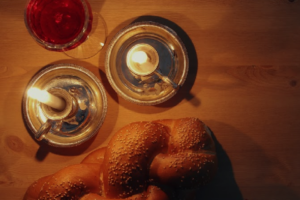Services every Saturday at 10:40 AM
Shabbat/Havdalah
Shabbat
Genesis 2:1-3 says, “So the heavens and the earth were completed along with their entire array. G-D completed – on the seventh day – His work that He made, and He ceased – on the seventh day – from all His work that He made. Then G-D blessed the seventh day and sanctified it, for on it He ceased from all His work that G-D created for the purpose of preparing.” From the beginning of time G-D establishes both the significance of the day and the purpose of the day.

Later, in time G-D would establish, for His covenant people, guidelines as to how the day was to be observed. In Exodus 20:8, G-D establishes Shabbat as the fourth of the the Ten Words (Commandments) G-D establishes the Shabbat as foundational to Jewish life when He commands that they “remember the Shabbat and keep it holy”. Later in Leviticus 23:3 & 4, they are told that “Work may be done for six days, but the seventh day is a Shabbat of solemn rest, a holy convocation. You are to do no work – it is a Shabbat to Adonai in all your dwellings.”
Shabbat begins at sunset on Friday (Erev Shabbat) and concludes at sundown on Shabbat night (Motzei Shabbat). It is customary to welcome Shabbat with the home prepared to receive the Shabbat (cleaned, food prepared through Shabbat, table set, Shabbat clothing laid out). Candles are lit, liturgy is recited, songs are sung, and a special meal is shared with family and friends.
Havdalah
Shabbat is a sweet time in which we often desire to stay. But when Motzei Shabbat (“going out of” or after) arrives (no earlier than when three stars are visible in the sky) we must move from the sacred time to the ordinary times. It is customary to do this through the experience of Havdalah. This brief, but poignant ceremony allows us to mentally and emotional prepare for the activities of the coming week and the ensuing anticipation of the next Shabbat.
The ceremony helps us to ponder the difference between the holy and the everyday. The Havdalah ceremony includes singing various brachot (blessings) of: wine in which we savor the joy of Shabbat; spices, in which reflect upon the sweetness of Shabbat; candles which while looking at our nails in the light we remember the distinction between light and dark.